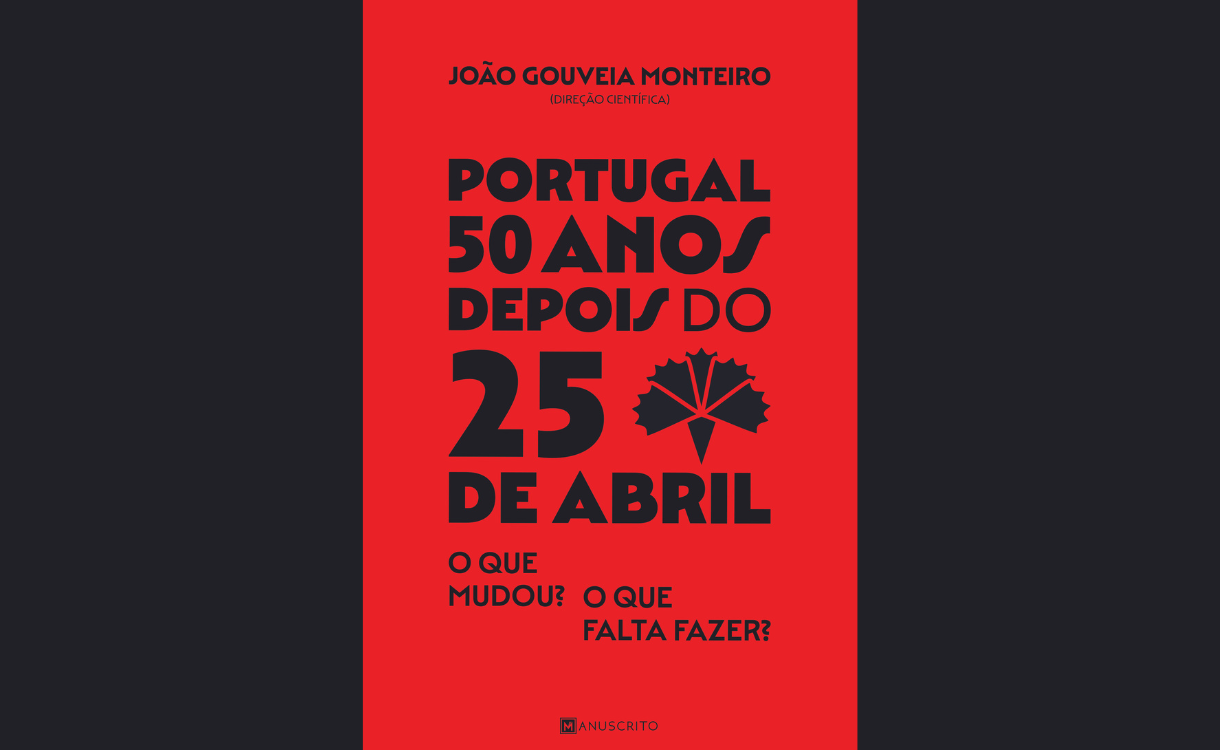Blog
22 of April of 2024
Portugal 50 years after April 25!

The UC General Library, of which I was director between 2019 and 2023, organized a series of talks on April 25 and the changes that have taken place in Portugal to date. Speakers included Diogo Abreu and Eduardo Anselmo (Demography and Spatial Planning); Boaventura de Sousa Santos and Cristina Roldão (Citizenship and Individual Rights); Helena Roseta and Paulo Marques (Being Young in Portugal); Abílio Hernandez and Maria Vlachou (Literacy, Culture and the Arts); Joaquim Furtado and Clara Almeida Santos (Journalism, Fake News and Social Networks); Manuela Cruzeiro and André Barata (Utopias: Freedom; Time).
The result (which includes the debates with the audience) has just been published by Manuscrito, coordinated by Isabel Campante, Beatriz França and Humberto Martins. I would like to highlight the major achievements resulting from the military rebellion and the popular revolution that followed:
1st - Universality and equality of rights and duties for all citizens: No one can be discriminated against because of their ancestry, sex, race, language, religion, beliefs, education or economic and social situation (1976 Constitution, one of the most advanced in the world).
2 - Freedom of expression, association and participation in public life. The right to freely express and disseminate thought, without prior censorship. Freedom of association and the creation of political parties. Universal, equal and secret suffrage for all citizens over the age of 18.
3rd - National Health Service. Created in 1979. Universal, general, tending to be free, integrative and humanistic. In 1974 there were 94 doctors and 159 nurses per 100,000 inhabitants. Today we have 567 doctors and 774 nurses (plus 155 pharmacists, compared to 55 in 1990, the first year on record).
4th - Education. In 1973 there were c. 25% illiterates, today there are 3%. Compulsory schooling is 12 years, previously it was between 6 and 8 years, and there was almost no pre-school education. The end of the dictatorship democratized education, despite school dropouts. Enrolment in higher education in 1978: 81,582; in 2022: 433,217 (with a female majority).
5th - Justice. Consecration of rights and freedoms. Revision of the 1966 Civil Code, repealing the diminished legal personality of women, recognizing the equality of spouses and putting an end to illegitimate children. Creation of the Public Prosecutor's Office as an independent judiciary and holder of the criminal prosecution. Access for women to the judiciary.
6th - Access to employment and the right to work. Equal opportunities in the choice of profession. The right to decent pay, hygiene and safety. Freedom of association, the right to strike and collective bargaining. No more unfair dismissals.
7th - National Minimum Wage and unemployment benefit. The SMN was introduced in 1974 and was worth €16.5. It then rose to the €820 it is today (by inflation, it should be around €1,200). The extended unemployment benefit was introduced in 1975 and is equivalent to 65% of basic pay.
8th - Vacation and leave. The right to vacation used to be the privilege of a few and for only eight days after five years' service. Today it has become widespread and covers at least 22 days. Christmas allowance was only extended to all workers in 1975. Maternity leave was enshrined in 1976 and increased progressively, from 90 to the current 150 to 180 days of parental leave.
9 - Reduced working hours. In 1971, people worked 48 hours a week (over 6 days). Then came the "English week" (freeing up Saturday afternoon) and, finally, a reduction to the current maximum of 35 hours (over five days).
10th - The end of the Colonial War (1961-1973). It mobilized 50,000 to 150,000 young men a year and resulted in 8,290 deaths. It resulted from the Estado Novo's inability to read the world and find a political solution. It was soon doomed by: a lack of cadres and troops; poor instruction; obsolete equipment; the intensity of the conflict; and moral and psychological degradation. This is how the Estado Novo dug its grave...
Article written by: João Gouveia Monteiro
The result (which includes the debates with the audience) has just been published by Manuscrito, coordinated by Isabel Campante, Beatriz França and Humberto Martins. I would like to highlight the major achievements resulting from the military rebellion and the popular revolution that followed:
1st - Universality and equality of rights and duties for all citizens: No one can be discriminated against because of their ancestry, sex, race, language, religion, beliefs, education or economic and social situation (1976 Constitution, one of the most advanced in the world).
2 - Freedom of expression, association and participation in public life. The right to freely express and disseminate thought, without prior censorship. Freedom of association and the creation of political parties. Universal, equal and secret suffrage for all citizens over the age of 18.
3rd - National Health Service. Created in 1979. Universal, general, tending to be free, integrative and humanistic. In 1974 there were 94 doctors and 159 nurses per 100,000 inhabitants. Today we have 567 doctors and 774 nurses (plus 155 pharmacists, compared to 55 in 1990, the first year on record).
4th - Education. In 1973 there were c. 25% illiterates, today there are 3%. Compulsory schooling is 12 years, previously it was between 6 and 8 years, and there was almost no pre-school education. The end of the dictatorship democratized education, despite school dropouts. Enrolment in higher education in 1978: 81,582; in 2022: 433,217 (with a female majority).
5th - Justice. Consecration of rights and freedoms. Revision of the 1966 Civil Code, repealing the diminished legal personality of women, recognizing the equality of spouses and putting an end to illegitimate children. Creation of the Public Prosecutor's Office as an independent judiciary and holder of the criminal prosecution. Access for women to the judiciary.
6th - Access to employment and the right to work. Equal opportunities in the choice of profession. The right to decent pay, hygiene and safety. Freedom of association, the right to strike and collective bargaining. No more unfair dismissals.
7th - National Minimum Wage and unemployment benefit. The SMN was introduced in 1974 and was worth €16.5. It then rose to the €820 it is today (by inflation, it should be around €1,200). The extended unemployment benefit was introduced in 1975 and is equivalent to 65% of basic pay.
8th - Vacation and leave. The right to vacation used to be the privilege of a few and for only eight days after five years' service. Today it has become widespread and covers at least 22 days. Christmas allowance was only extended to all workers in 1975. Maternity leave was enshrined in 1976 and increased progressively, from 90 to the current 150 to 180 days of parental leave.
9 - Reduced working hours. In 1971, people worked 48 hours a week (over 6 days). Then came the "English week" (freeing up Saturday afternoon) and, finally, a reduction to the current maximum of 35 hours (over five days).
10th - The end of the Colonial War (1961-1973). It mobilized 50,000 to 150,000 young men a year and resulted in 8,290 deaths. It resulted from the Estado Novo's inability to read the world and find a political solution. It was soon doomed by: a lack of cadres and troops; poor instruction; obsolete equipment; the intensity of the conflict; and moral and psychological degradation. This is how the Estado Novo dug its grave...
Article written by: João Gouveia Monteiro



.png)